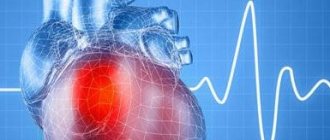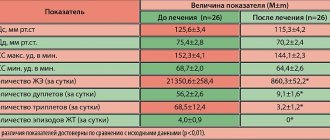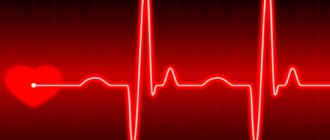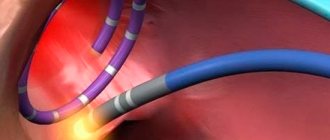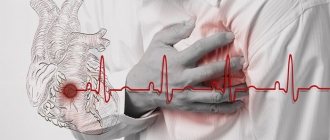11.11.2018 · Pro Psychosomatics · Comments: ·
It is no longer a secret to anyone that the causes of many diseases lie within the person himself and are caused by his emotional state. Today we’ll talk about the heart, let’s look at why the psychosomatics of arrhythmia (heart rhythm disturbances) appear and how to work with it.
You need to understand that heart rate can change even in a healthy person. For example, when we are calm, our heartbeat is normal. But if we play sports, it naturally increases.
The pathology differs from the norm in that accelerations and decelerations occur regardless of physical activity.
There are two main causes of heart rhythm disturbances:
1 - physiological (diseases of the cardiovascular system),
2 - psychological (constant stress caused, for example, by a feeling of fear).
Arrhythmia has psychological causes if you notice that it is stress that leads to the feeling that “your heart will jump out of your chest.” But a medical examination (even with such symptoms) shows that everything is fine with the organ.
The connection between the psyche and the heart is simple and clear.
Those who have problems with rhythm disturbances know very well that there is no need to be nervous. This is what makes it worse. That is, the emotions we experience directly affect us. The work of the heart is closely related to the work of the brain.
Therefore, it is very important to learn to react to events in such a way that these reactions do not cause a response in the body. That is, the heart should work normally regardless of your emotional background. How to do this is discussed below.
What are the causes of psychosomatic arrhythmia?
If the heart rhythm is disturbed, the pressure usually jumps and the pulse rate is disturbed (this can be checked on the wrist).
At first glance, it is very difficult to distinguish a psychosomatic nature from a physiological one based on these signs. And doctors won’t even suggest you do this.
How to understand that you have psychosomatic arrhythmias?
Very simple.
If you feel that your heartbeat is disturbed at those moments when you have an emotional outburst (anger, fear), this clearly indicates reasons of an emotional nature. You can get very scared - and this will also affect your heart function. Some people experience trembling, numb limbs, and a feeling of lack of air.
At the same time, when a person notices a rapid heartbeat, he may be overcome by the fear of sudden death, the heart begins to beat even faster, and this raises the fear that it will stop altogether.
All this points precisely to psychological reasons. Moreover, according to statistics, melancholic people are usually susceptible to them.
What lies behind the reason is most often 2 emotions: anger and fear. The second of them is the main one.
The fact is that during fear, the body releases various hormones (for example, adrenaline) and other substances that pass through the heart. The organ experiences their influence even in a healthy person. However, it does not cause any problems; the effect is usually short-lived.
Increases and delays appear most often in those who had an initial predisposition. That is, the emotion of fear in another person will have an impact, for example, on the stomach (read our article on the psychosomatics of the stomach and duodenum here). Because that will be his predisposition.
It should be noted that the various tables on psychosomatics are very general. And in practice, we, as specialists with psychological and medical education, have been convinced hundreds of times that each person has an individual reason.
What is psychosomatic dysfunction
Psychosomatic disorders are a group of pathologies that develop in the body as a response to a stress factor. Very often we encounter migraines, pain in the neck and back. The psychosomatics of such pathologies may have a hidden meaning, which only a qualified specialist can understand.
Scientists argue that psychosomatic pathologies arise precisely when a person is unable to adapt to new conditions of existence. That is, at this moment our nervous system is not able to cope with the huge flow of information.
For example:
- It is difficult to perform mental work in a noisy room (music, conversations, renovations in the next room).
- A combination of several tasks at the same time: a minibus driver drives a vehicle, monitors pedestrians and traffic lights, monitors for potholes on the road, and at the same time accepts fares and gives change.
It is not difficult to imagine that the above situations cause nervous irritation and emotional tension. As a result, headaches, chest pain, great fatigue, decreased attention, blurred vision, etc. appear.
It should also be noted that, in addition to individual signs, there is also a huge list of psychosomatic pathologies (bronchial asthma, cardiovascular pathologies, allergic reactions, etc.). They will develop when psychogenic factors arise.
Historical reference.
Psychosomatic diseases began to be studied in ancient times. Hippocrates repeatedly noted that the psychological and physiological states of a person are interconnected, but the term began to be used in the medical field only at the beginning of the 19th century.
What role do parent-child relationships play in psychosomatics?
Child-parent relationships play a special role in the formation of fears (this is where the trauma of rejection arises and traumatic situations occur). Which greatly affects reactions in adulthood.
For example, low self-esteem in clients often indicates strict upbringing by parents, their approval only for desirable behavior and rejection for undesirable behavior. As a result, an assessment of oneself simply cannot be formed, and instead a dependent self-esteem is formed (what will they say about me).
This leads to anxiety and fear of the future (although at the root lies the fear of the mother figure: her disapproval and rejection). Then, through this emotion, relationships between spouses (or with colleagues) begin to build. A person “hangs” the image of a strict parent on others, he himself is afraid, he himself is angry.
Of course, all this can be seen very clearly during consultations. But it is not at all obvious to the client himself before starting work (because it is very difficult to analyze oneself; even professionals undergo supervision from other psychotherapists in order to work out their own distortions).
How to treat correctly
Treatment involves a psychotherapeutic and medication approach. Since the root of the problem is related to a psychological problem, it is worth starting treatment with a psychotherapist. It will help the patient work through a long-standing problem, thereby relieving him of suffering.
But since there are already consequences in the form of diseases, it is impossible to do without consulting a cardiologist. Prescribed medications will help eliminate unpleasant symptoms. You should not rely on only one option, since to cure psychosomatic arrhythmia which is associated with an incorrect rhythm of life, a person will need to learn to love himself and others, to accept love, depending on the disease.
How is psychosomatics of heart rhythm disturbances treated?
Having realized that the reason lies in your emotional background (and it is usually associated with an emotion such as fear), you should begin treatment in this proven way:
1 - It is good to be examined for physiological disorders and do not ignore this issue. Be sure to visit a doctor.
2 - But sustainable improvement and recovery will begin when you work on your emotions.
Think about what exactly could be the root cause. What situation triggered the disease? When did you first notice it? Perhaps there is a situation that you still “carry within yourself” and you cannot work through it?
If you cannot remember it and understand that the condition has worsened over a long time, this indicates that the situations were layered on each other.
Try to answer what you are afraid of, for how long and why?
3 - It is necessary to completely stop smoking (it greatly affects the state of the cardiovascular system).
4 - Sports wouldn't hurt. Not only will it allow you to improve your circulatory system, but it will also have a beneficial effect on your emotional state (here about how sports helps with depression and anxiety).
5 - Pay special attention to those situations that cause stress. If you clearly know what these cases are, try to minimize them;
If this does not work out (for example, you experience constant stress at work), you need to work with your condition so that the body no longer has such a reaction to them in the form of heart rhythm disturbances.
This is more than possible with constant work with special psychological techniques. That is, the situations will remain, but your perception of them will change, which will not cause previous reactions. Accordingly, the heart will not have to pass through itself a set of hormones and chemicals that affect acceleration and deceleration.
6 - Breathing practices, art therapy and music therapy are effective.
It takes quite a long time to master these techniques yourself. Therefore, the easiest way is to seek help from a psychologist. A specialist will help:
- find your specific reason,
- select precise techniques, master them and consolidate them until results appear.
7 - Learning to relax.
Meditation, daily routine, rest, hobbies - all these are necessary conditions for recovery. The psychosomatics of arrhythmia go away faster when you simply learn to relax.
Angina pectoris and psychosomatics
Angina is characterized by a lack of blood in one area of the heart. It turns out that the body does not receive a certain amount of it, which then leads to ischemia. And if you do nothing further, then necrosis is guaranteed.
Dislike for yourself and others, lack of values and dislike for your own life leads to such a terrible diagnosis. Such people are not sincerely interested in others and do not experience joy or pity. They are protected from the world by a thick wall.
Psychosomatic pain in the heart, which is diagnosed as angina pectoris, can also occur in hypersensitive people. They are used to taking all the pain upon themselves.
How to cope with psychosomatics faster
Watch the video from our psychologist with more than 20 years of experience, Olga Kopylova. In it she talks about how psychosomatics is formed:
Two points are important: getting to the exact cause and choosing the right psychological techniques. If you break down all the work into stages, then it would be more advisable to go this way:
- determine the initial situation,
- specify the root emotion (anger, guilt, shame, grief - each has its own),
- select appropriate psychological techniques,
- check the correctness of their implementation,
- adjust the emotion (develop new reactions to provocations).
Moreover, you can take the first step to find the cause today. To do this, take our test:
Take the test
Example : you can read for a long time about constipation - that these are mental blocks, dislike for yourself. But in 95% of cases it appears in a state of choice, in limbo. If you have basic mistrust and anxiety, constipation becomes chronic and worsens during the period of choice.
Consequently, situations with choice will never end, but the attitude towards them can be changed using psychotherapeutic methods.
What do the majority do?
They study the theory, but do not achieve improvement.
The fact is that working independently with your unconscious requires a lot of preparation.
Do you need a specialist?
It will just be faster with him. It’s possible to cope on your own, but only a few can do it and it takes a long time.
In our practice, the terms varied from 1 consultation to a year. Quite common cases are:
- hemorrhoids in women,
- a sore throat,
- herpes,
- lungs (for example, bronchitis),
- various allergies,
- childhood illnesses through parents and others.
You can find out about working with us here. Moreover, the psychosomatics of arrhythmia are quite amenable to correction. I wish you health and psychological comfort.
General characteristics of psychosomatic diseases
The onset of ailments can be triggered by a number of events and psychological states:
- conflict;
- psychological complexes of a person;
- neurosis;
- jar of Hearts;
- death of loved ones;
- depression, etc.
These factors can trigger both the onset of the disease and its progression.
Many psychosomatic abnormalities are associated with human gender characteristics. For example, in childhood, bronchial asthma is most often diagnosed in boys, and in adulthood – in female representatives of humanity. Coronary disease most often affects women; hypertension predominantly affects men.
As a rule, all psychosomatic pathologies occur in phases. They have periods of exacerbation, which mainly appear in the autumn and spring seasons.
Doctors note that psychosomatic diseases develop taking into account the character and temperament of a person. Aggressive, hot-tempered people are more prone to cardiovascular diseases, while modest and shy people are more likely to suffer from intestinal and stomach diseases.
Prevention
A calm, friendly environment in the family is the best prevention of psychosomatic diseases in both children and adults. Be healthy, and let neither the topic of psychosomatics nor the problem of impaired blood flow in the brain touch you.
ATTENTION!
All materials on the site (including video and audio clips on third-party resources) are for educational and informational purposes only. There are contraindications. Before using recommendations and advice from the site and videos, ALWAYS consult your doctor! All patient names used in articles on this site have been changed for ethical reasons. Any similarities are random.

